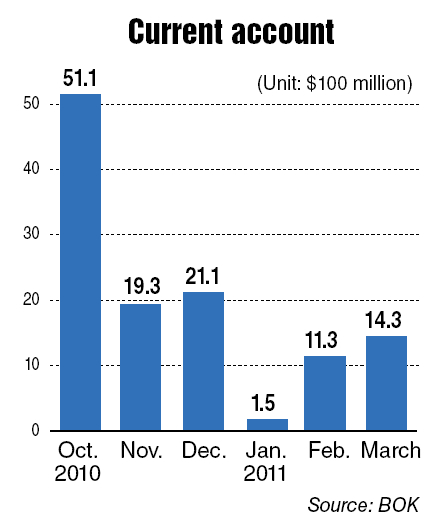South Korea’s current account surplus rose to the highest level in three months in March as exports of ships and other key products remained robust, the central bank said Thursday.
The current account surplus reached $1.43 billion in March, up from a revised $1.13 billion the previous month, according to the Bank of Korea. The current account is the broadest measure of cross-border trade.

The March surplus was the largest since $2.11 billion in December. The current account remained in the black for the 13th straight month in March, aided by strong exports, which account for about 50 percent of the Korean economy.
The BOK said although sharp gains in oil prices jacked up import bills, expansion in overseas shipments increased the country’s current account surplus, offsetting a rise in dividend payouts by local firms to foreign investors.
The local currency has appreciated more than 5 percent to the dollar since January amid sustained growth of exports and foreigners’ stock buying. The surplus is widely expected to add further upward pressure on the won, which hit a yearly high per the greenback on Wednesday.
South Korea’s goods balance posted a surplus of $2.86 billion in March, up from a revised $1.53 billion in February.
A shortfall in the service account, which includes outlays by South Koreans on overseas trips, narrowed to $328 million in March, compared with a $569.1 million deficit the previous month.
The primary income account, which tracks wages for foreign workers and dividend payments overseas, logged a deficit of $858.4 million last month, a turnaround from a surplus of $542.6 million in February.
In March and April, offshore investors repatriated dividend payments by Korean companies that close their books in December, sapping the country’s income account balance.
Meanwhile, the capital and financial account, covering cross-border investments, posted a net inflow of $498.5 million in March, compared with a net outflow of $2 billion the previous month.
Overseas borrowing reached $8.62 billion in March, sharply up from $2.69 billion the previous month mainly because local branches of foreign banks increased borrowing from overseas. Short-term borrowing came in at $6.72 billion in March, the highest since August 2008, the bank added.
South Korea is considering further lowering the ceiling of foreign currency derivatives trade handled by local banks in a bid to curb a sharp rise in short-term external debt. The government stiffened rules on banks’ FX derivatives positions last year as excessive movement of foreign capital and growing short-term debt are blamed for market instability.
On April 13, the BOK revised down its projection for the current account surplus to $11 billion for this year from $18 billion, as a spike in oil prices will likely jack up import bills.
(Yonhap News)








